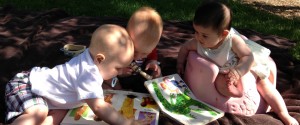7 Key Ways to Encourage Toddlers to Talk
” We Love to Talk “
Developing strong reading and writing skills is an important step in preparing your child to begin school. You can play these fun vocabulary-building games with your toddler and preschooler while laying the foundation of language skills your child will need to do well in kindergarten and beyond.
Before You Get Started
Remember, play is your child’s work, and you are your child’s first teacher. Be patient and make learning enjoyable. Use your time playing together not only to teach but to create good memories between you. A happy child learns better.
Spend an average of 15 to 20 minutes on each game. When your child loses interest, it’s time to stop playing. Clean up and put things away together as you talk about the activity, what he liked, what he needed help with, and so on.
Let the Games Begin! Gather a variety of objects from around the house, such as a pencil, pillow, pans, stuffed animal, socks, crackers, and a blanket. Describe the objects in as many ways as you can: smooth, rough, soft, flexible, hard, square, red. Ask your child to pick the items that are fuzzy, rigid, and so on. Give definitions of the words she doesn’t know as you go. Don’t worry if some of the words are above her comprehension right now; the goal here is to expand her vocabulary by exposing her to new words.
Listen to Your Child
By conversing with your child at her physical level—eye-to-eye—you’re letting her know that she’s captured your complete attention. This small act builds your child’s self confidence and allows you to focus on what she has to say. Parents should strive to provide support and encouragement whenever their child speaks. All too often we say, “Shhhh!” or, “Not now, Honey” when our children talk.
If you must quiet your child temporarily, be sure to return to her, on her level, and ask her to repeat herself so you can hear what she has to say.
While we teach our children not to interrupt and should hold ourselves to the same standard, adults must sometimes interrupt children to move forward with an activity or conversation. Extend the courtesy you expect from your child by being polite and courteous, saying “excuse me,” “please,” “sorry,” and “thank you.” Modeling appropriate behavior is the most effective way to teach manners and etiquette vocabulary.
Engage Your Child in Conversation
If you’ve ever tried to converse with someone who doesn’t want to talk, you know that simple “yes” or “no” questions can quickly kill a conversation. The same is true with children. “For any number of reasons, most adults are much better talking at children than they are at talking with them.” To exercise your child’s vocabulary, ask questions that require in-depth answers. For instance, instead of asking a child if he wants pasta for lunch, ask which kind of pasta he wants and why he likes this particular kind. The more a child has to use his words, the more adept he will become at conversation and vocabulary will improve naturally.
Understand Which Words Come First
Because nouns are symbols that represent tangible things, they are usually the first words a child understands. A 20-month-old’s vocabulary consists mostly of nouns, no matter which language he speaks.
Parents can focus teaching based on this natural progression of understanding. Sit with your child and name, don’t describe, items from his toy box. Children can comprehend and learn to describe how the items look and feel later with simple verbs (run, jump, eat, play) and adjectives to describe emotions, colors, and sizes.
Read to Your Child
Reading to children fosters a love for literature and improves vocabulary through exposure to words. “Reading aloud is particularly helpful when the reader pauses during reading to define an unfamiliar word and after reading engages the child in a conversation about the book.

Play Games with Your Child
Play games with your child. From familiar unnamed games like “What sound does this animal make?” to the ever-popular I Spy, one-on-one parent-child games offer concentrated time for teaching, learning, and bonding.
Older kids enjoy parent-child games for road trips or waiting at the doctor’s office. Try “Name a Synonym” or “Name an Antonym.” Another fun option pairs a letter and a location to make a word association game. You may say, “Things in an airport that start with the letter H.” Once kids learn these games, they’ll follow your example and play them with friends.
Build a Learning Environment at Home
What’s in your family room? Probably a television and stereo, maybe an Internet connection or video games, and a collection of CDs and DVDs. What about books, art supplies, maps, puzzles, and board games?
Providing a rich learning environment at home can help all aspects of a child’s education, including vocabulary. After watching a nature video, can your child find maps to learn where the video was shot? Can he find supplemental photos and literature about the animals? Discussions will come naturally if you provide a welcoming atmosphere. A word-rich educational environment should also provide a good student dictionary, thesaurus, and a set of encyclopedias or online encyclopedia.





